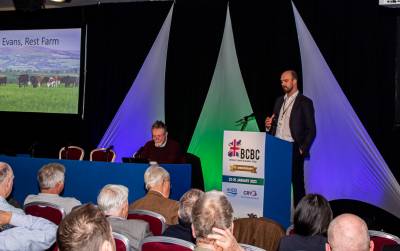

Collaboration, efficiency and connection with the end consumer were themes for the fourth Beef Day session at the BCBC conference. Delegates heard from three speakers – Aled Evans, Richard Phelps and James Evans – each with different viewpoints of the beef supply chain.
Collaboration is an over-used word in beef production systems, but it is important, says Richard Phelps. One of the key things to any true integrated supply chain is sharing risk. Examples of collaboration in practice include co-operative purchasing to reduce costs but it was also possible to improve health and welfare through sharing data.
He outlined the Gamechanger integrated supply chain for dairy-beef into Sainsburys. “We select our bulls based on data. We’re buying an animal that will have all the cuts in the right place – that’s key to us.” Reducing carbon in the supply chain was one of the goals of the system, he said. “If we don’t, if we ignore it, we ignore a massive market. We don’t want consumers to turn off to beef and go to other proteins or non-proteins because of this, so we are working ahead to ensure we can reduce our carbon.” Faster growth, improved feed efficiency and better yields were all part of that, he explained.
Profit, lifestyle and legacy are the three pillars of decision making for Aled Evans who farms in partnership with his brother Iwan in mid Wales. The brothers rear dairy beef calves on their farm in Carmarthenshire and were named Beef Farmers of the Year.
“We need profit to sustain and grow the business.” Maximising efficiency and keeping costs of production low in their grass-based system was central to that. In terms of lifestyle, Aled explained that with a young family he didn’t want to be working long hours. “I think there is a badge of honour in farming that working 90 or 100 hours is the thing to do but from a mental or physical perspective there is no gain at all. We set a 50-hour working week and for the team that is really important.” Time off and time away from the farm was also considered important and encouraged. The legacy element included enabling others to reach their business goals, alongside “developing a resilient business that we’re proud of”.
Cutting out purchased inputs including fertilisers and feed has meant a far more resilient system with a low-cost base. “When the beef price is low, we can ride it out and when it’s high we can make the most of it,” he said. Initially thoughts about carbon centred around potential added sales value or carbon credits. More recently the Evans considered it as a ‘social licence to continue operating’. “Consumers we work with care about our environmental footprint,” he said.
Plans are underway for an additional unit where cattle could be outwintered and this expansion also offered career progression potential for employees, he said. “We’re excited about the future.”
A chance meeting with the owner of Honest Burgers led to James Evans working with two other farmers to form Grassroots Farming to supply the restaurant chain with beef from regenerative farms. The trio wanted to create a way to disrupt the current model, he said, with farmers’ interests at heart. “How can we do things differently to create a farmer supply chain for farmers? Collaborating with other farmers is vital,” he said. “We are all paddling our own ship but by working together we can create more good.” Farmer producers would be rewarded for improvements to biodiversity with baseline measurements taken when they join the scheme. Farmers now have the opportunity for being rewarded because they are able to access companies that have ‘huge budgets’ for sustainability schemes like this one, and a desire to work with farmers.
Whilst better prices was one clear improvement, reconnecting consumers with food was just as important he said. “Before this I was a commodity producer – we just put it on a wagon and there’s no connection. To see people eating burgers from beef I’ve produced on my farm was emotional. As farmers we all think it’s price, but actually the feel-good factor is important too – the connection with the end consumer.”
Photos Credit @Jenny Wood Photography